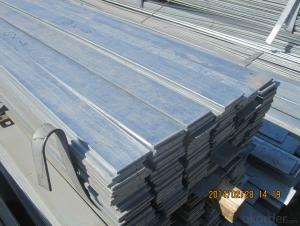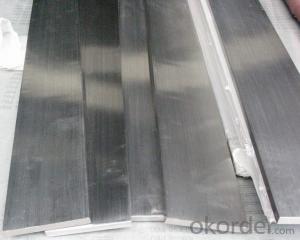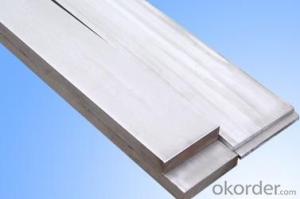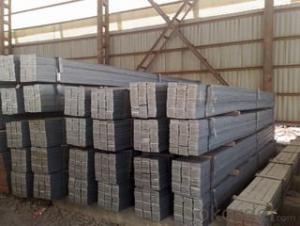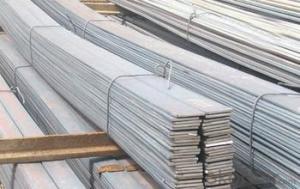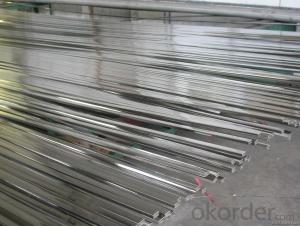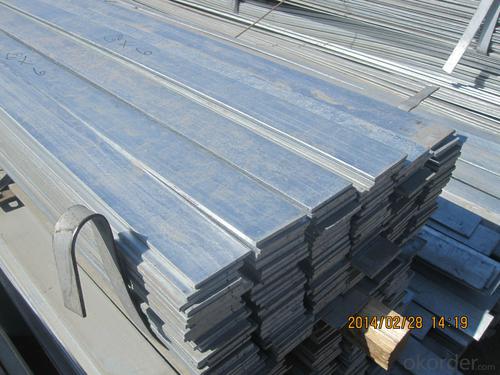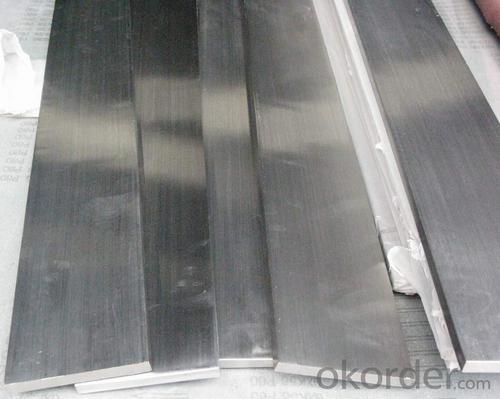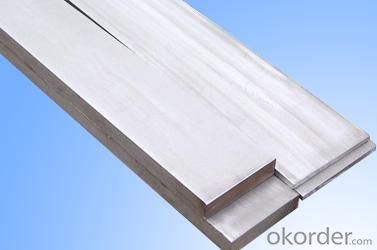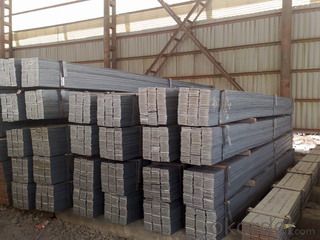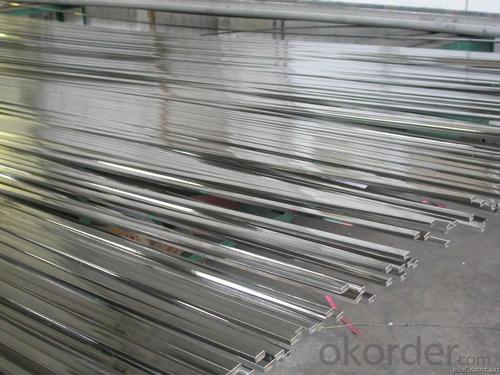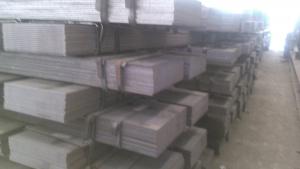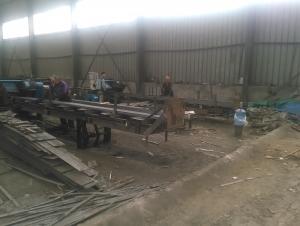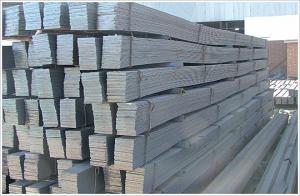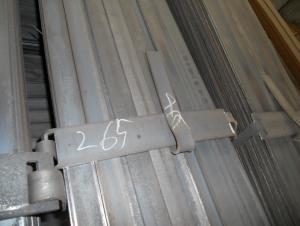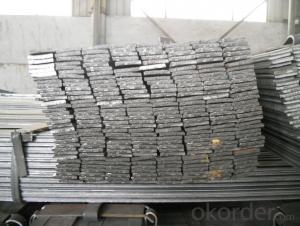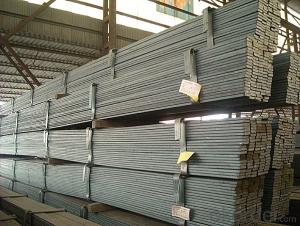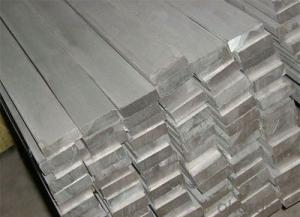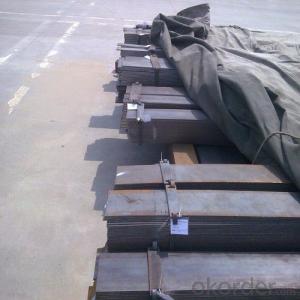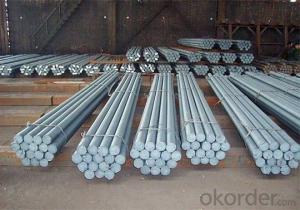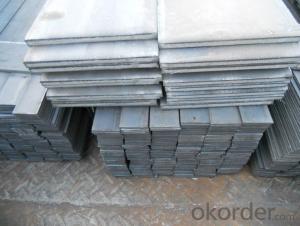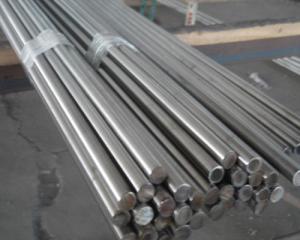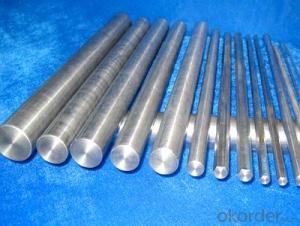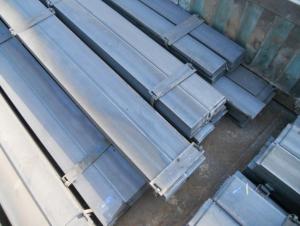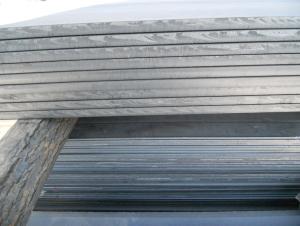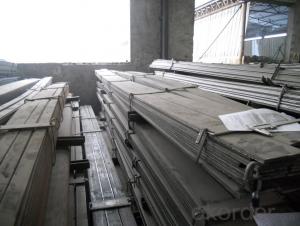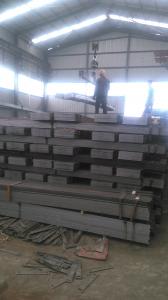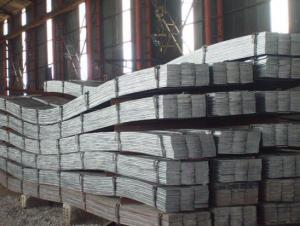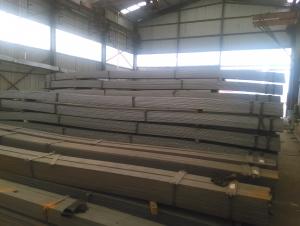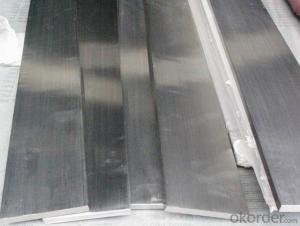Grade 321 Stainless Steel Flat Bar with High Quality
- Loading Port:
- Tianjin
- Payment Terms:
- TT OR LC
- Min Order Qty:
- 3 m.t.
- Supply Capability:
- 10000 m.t./month
OKorder Service Pledge
OKorder Financial Service
You Might Also Like
Grade 321 Stainless Steel Flat Bar with High Quality
Details of Grade 321 Stainless Steel Flat Bar with High Quality
Name | 200,300,400 series Stainless Steel Flat Bar |
Shape | Flat Bar |
Standard | GB/ASTM/SAE/AISI/DIN/JIS/EN/BS |
Surface Treatment: | Black/Peeling/Polished/Machined |
Delivery Condition: | Hot Rolled or Forged/Peeled or Black Surface |
Test | SGS/UT 100% Elements Testing |
Certificate: | ISO/Mill Certificate |
Service: | 24 hours online service / |
more than 20 years trading and manufacture | |
Quality Assurance: | the third party inspection, such as SGS, BV, TUV…etc. is acceptable |
Packaging Details: | Seaworthy Packaging or as per customer's packing instruction |
steel flat bar grade | 201/304/304L/309L/316/321 |
steel flat bar standard | GB, ASTM, AISI, EN, JIS |
steel flat bar thickness | 3mm-12mm |
steel flat bar width | 19mm-140mm |
steel flat bar length | 2m~6m or as customer requirement |
steel flat bar technique | Slitting hot rolled steel coil |
Chemical Composition of Grade321 Stainless Steel Flat Bar with High Quality
Grade and Main chemical composition% | |||||||||
| C | Si | Mn | P≤ | S≤ | Cr | Mo | Ni | Other |
201 | ≤0.15 | ≤1.00 | 5.5-7.5 | 0.06 | 0.03 | 16-18 | - | 3.5-5.5 | N≤0.25 |
304 | ≤0.08 | ≤1.00 | ≤2.00 | 0.045 | 0.03 | 18-20 | - | 8-10.5 | - |
304L | ≤0.03 | ≤1.00 | ≤2.00 | 0.045 | 0.03 | 18-20 | - | 13-Sep | - |
309S | ≤0.08 | ≤1.00 | ≤2.00 | 0.045 | 0.03 | 22-24 | - | 15-Dec | - |
316 | ≤0.08 | ≤1.00 | ≤2.00 | 0.045 | 0.03 | 16-18 | 3-Feb | 14-Oct | - |
321 | ≤0.08 | ≤1.00 | ≤2.00 | 0.045 | 0.03 | 17-19 | - | 13-Sep | Ti≥5×C |
CNBM Introduction of Grade321 Stainless Steel Flat Bar with High Quality
CNBM International Corporation is the most import and export platform of CNBM group(China National Building Material Group Corporation) ,which is a state-owned enterprise, ranked in 270th of Fortune Global 500 in 2015.
With its advantages, CNBM International are mainly concentrate on Cement, Glass, Iron and Steel, Ceramics industries and devotes herself for supplying high quality series of refractories as well as technical consultancies and logistics solution.
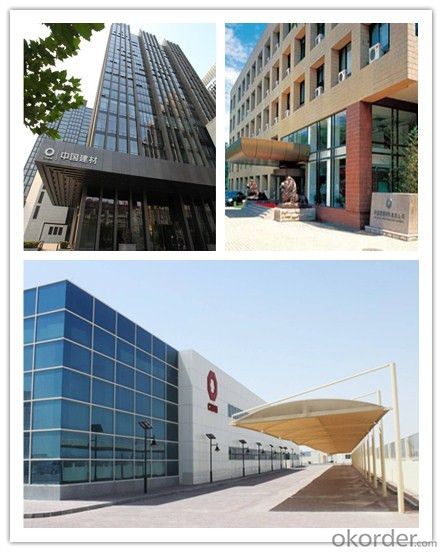
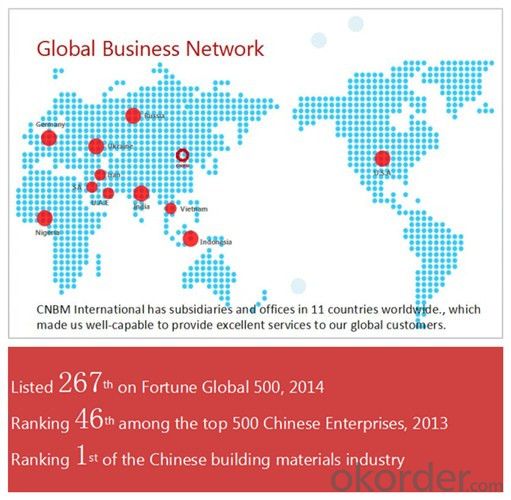
After-sale service |
|
Advantages
|
|
Packaging & Delivery of Grade321 Stainless Steel Flat Bar with High Quality
Packaging Detail | Sea worthy packing /as per customer's packing instruction |
Delivery Detail | 15 ~ 40 days after receiving the deposit |
Products Show
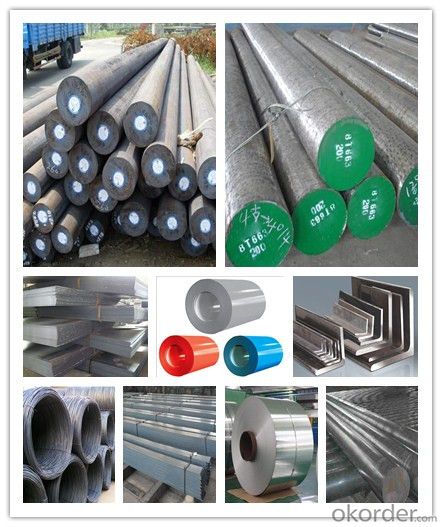
FAQ:
Are you a trading company or manufacturer? | Manufacturer |
What’s the MOQ? | 3 metric ton |
What’s your delivery time? | 15-35 days after downpayment received |
Do you Accept OEM service? | Yes |
what’s your delivery terms? | FOB/CFR/CIF |
What's the Payment Terms? | 30% as deposit,70% before shipment by T/T |
Western Union acceptable for small amount. | |
L/C acceptable for large amount. | |
Scrow ,Paybal,Alipay are also ok | |
Why choose us? | Chose happens because of quality, then price, We can give you both. Additionally, we can also offer professional products inquiry, products knowledge train (for agents), smooth goods delivery, excellent customer solution proposals. |
What's your available port of Shipment? | Main Port, China |
What’s your featured services? | Our service formula: good quality+ good price+ good service=customer's trust
|
Where are your Market? | Covering more than 160 countries in the world |
- Q: Are steel flat bars resistant to chemical exposure?
- Yes, steel flat bars are generally resistant to chemical exposure. Steel is known for its high resistance to chemical reactions, making it suitable for various applications where exposure to chemicals is a concern. However, the specific level of resistance can vary depending on the type of steel and the chemicals involved, so it is always advisable to consult the manufacturer or conduct proper testing for a particular chemical environment.
- Q: What are the fire-resistance properties of steel flat bars?
- With their exceptional fire-resistance properties, steel flat bars demonstrate great strength. Their resistance to high temperatures, without compromising their structural integrity, is noteworthy. Steel bars remain unaffected by fire, avoiding any contribution to the spreading of flames, thus making them a dependable option for fire-resistant structures. Moreover, their low thermal conductivity adds to their fire-resistance capabilities by preventing the easy transfer of heat. Consequently, steel flat bars are extensively employed in construction projects that prioritize fire safety.
- Q: What are the different types of surface defects that can be found in steel flat bars?
- There are several different types of surface defects that can be found in steel flat bars. These defects can vary in severity and may affect the overall quality and performance of the steel. Some common types of surface defects include: 1. Scale: Scale refers to the thin layer of oxide that forms on the surface of steel during the hot rolling process. While it can be removed through various methods, it may still leave behind a rough or uneven surface. 2. Pitting: Pitting is characterized by small, localized depressions or craters on the surface of the steel. It can be caused by corrosion, improper storage, or manufacturing processes. 3. Scratches: Scratches are visible marks or lines on the surface of the steel, which can be caused during handling, transportation, or processing. While they may not affect the structural integrity, they can impact the aesthetic appeal of the steel. 4. Lamination: Lamination refers to the separation or splitting of steel layers along the surface. It can be caused by poor quality control during manufacturing or excessive rolling. 5. Roll marks: Roll marks are repetitive patterns or lines on the surface of the steel caused by the rolling process. These marks can affect the appearance and flatness of the steel. 6. Inclusions: Inclusions are non-metallic substances that are trapped within the steel during the manufacturing process. These include oxides, slag, or other impurities that can form visible spots or irregularities on the surface. 7. Decarburization: Decarburization occurs when the surface of the steel loses its carbon content due to exposure to high temperatures or improper heat treatment. This can result in a softer or weaker surface layer. 8. Cracks: Cracks are visible fractures or breaks in the steel surface, which can be caused by excessive stress, improper cooling, or poor manufacturing practices. These defects can significantly compromise the strength and integrity of the steel. It is important to inspect and identify these surface defects in steel flat bars to ensure that the material meets the required specifications and standards. Depending on the severity of the defect, appropriate measures such as grinding, polishing, or even rejecting the material may be necessary.
- Q: What are the different types of coatings available for steel flat bars?
- There are several different types of coatings available for steel flat bars, each offering unique properties and advantages. 1. Galvanized Coating: This is one of the most common types of coatings for steel flat bars. It involves applying a layer of zinc to the surface of the steel, which provides excellent corrosion resistance. Galvanized coatings are durable and can withstand harsh environments, making them suitable for outdoor applications. 2. Powder Coating: Powder coating involves applying a dry powder to the surface of the steel flat bar, which is then cured under heat to form a protective layer. This coating offers excellent durability, resistance to chipping, and a wide range of color options. Powder coatings are often used for decorative purposes or in applications where a durable and aesthetic finish is desired. 3. Epoxy Coating: Epoxy coatings are a popular choice for steel flat bars that will be exposed to corrosive environments. These coatings are applied as a liquid and then cured to form a hard, protective layer. Epoxy coatings provide excellent chemical resistance and can withstand exposure to acids, alkalis, and other corrosive substances. 4. Paint Coating: Paint coatings are a versatile option for steel flat bars, offering both protection and aesthetics. These coatings can be applied in various colors and finishes, providing a decorative and protective layer. Paint coatings may require periodic maintenance and touch-ups to maintain their effectiveness. 5. Anodizing: Anodizing is a process primarily used for aluminum but can also be applied to steel flat bars. It involves creating an oxide layer on the surface of the metal, which enhances its corrosion resistance and provides an attractive finish. Anodized coatings are particularly suitable for architectural and decorative applications. 6. Phosphate Coating: Phosphate coatings are a type of conversion coating that chemically reacts with the steel surface to form a protective layer. These coatings offer excellent adhesion, corrosion resistance, and improved paint adhesion. Phosphate coatings are commonly used as a pre-treatment before the application of paint or powder coatings. In conclusion, the different types of coatings available for steel flat bars include galvanized coatings, powder coatings, epoxy coatings, paint coatings, anodizing, and phosphate coatings. The choice of coating depends on the specific requirements of the application, such as corrosion resistance, durability, aesthetics, and environmental conditions.
- Q: Are steel flat bars suitable for indoor or outdoor applications?
- Steel flat bars are suitable for both indoor and outdoor applications. The versatility of steel makes it a popular choice for various construction projects, regardless of the environment. Steel flat bars are durable and resistant to corrosion, making them ideal for outdoor use where they may be exposed to moisture and harsh weather conditions. They can be used for outdoor structures such as fences, gates, and handrails, as well as for indoor projects like furniture, shelving, and support beams. Additionally, steel flat bars can be easily painted or coated to provide further protection against rust and enhance their aesthetic appeal. Overall, steel flat bars are a reliable and versatile option for both indoor and outdoor applications.
- Q: What are the different methods of fastening steel flat bars to other materials?
- There are several methods of fastening steel flat bars to other materials, depending on the specific application and desired level of stability and strength. Some common methods include: 1. Welding: Welding is a widely used method for fastening steel flat bars to other materials. It involves melting the steel bar and the other material together, creating a strong and permanent bond. Welding requires specialized equipment and skills, but it offers excellent strength and durability. 2. Bolting: Bolting is another common method of fastening steel flat bars. It involves using bolts, nuts, and washers to secure the bar to the other material. Bolting is relatively simple and versatile, allowing for easy installation and removal. It provides a strong connection, especially when using high-quality bolts and proper tightening techniques. 3. Riveting: Riveting involves inserting a rivet through holes in the steel flat bar and the other material, then compressing the end of the rivet to secure it in place. This method provides a strong connection and is commonly used in applications where welding or bolting may not be feasible or desirable. 4. Adhesive bonding: Adhesive bonding involves using a strong adhesive to attach the steel flat bar to the other material. This method is often used when aesthetics are a priority or when joining dissimilar materials. Adhesive bonding can provide a reliable and durable connection, but proper surface preparation and adhesive selection are crucial for ensuring the bond's strength. 5. Clamping: Clamping is a temporary method of fastening steel flat bars to other materials. It involves using clamps, such as C-clamps or spring clamps, to hold the bar in place. Clamping is commonly used during construction or assembly processes, allowing for easy adjustments or disassembly if needed. 6. Mechanical fasteners: Mechanical fasteners, such as screws or nails, can also be used to fasten steel flat bars to other materials. They are relatively simple to install and provide a secure connection, but their strength may be limited compared to welding or bolting. It is important to consider the specific requirements of the application when selecting a method for fastening steel flat bars to other materials. Factors such as load-bearing capacity, compatibility of materials, installation convenience, and desired level of permanence should be taken into account to ensure a successful and reliable connection.
- Q: What are the applications of steel flat bars in the automotive industry?
- Steel flat bars are extensively utilized in the automotive industry due to their wide range of applications and numerous benefits. Some of the primary uses of steel flat bars in the automotive sector include: 1. Chassis and Frame Components: Automobiles often incorporate steel flat bars in the construction of chassis and frame components. These bars offer the necessary strength and rigidity to support the vehicle's weight and endure various forces and vibrations. 2. Suspension Systems: Suspension systems, including leaf springs and torsion bars, are fabricated using steel flat bars. These components assist in absorbing shocks and vibrations, thereby enhancing the overall ride quality and stability of the vehicle. 3. Braking Systems: Steel flat bars are integral to the construction of various braking system components, such as brake shoes and brake rotors. They provide the essential strength and durability to withstand the high temperatures and pressures associated with braking. 4. Safety Features: Steel flat bars find application in the manufacturing of safety features like roll bars and roll cages. These components offer additional protection to the vehicle's occupants in the event of a rollover or collision, thereby improving overall safety. 5. Bumpers and Grilles: Automobile bumpers and grilles are often fabricated using steel flat bars. These bars provide impact resistance and safeguard the engine and other vital components located at the front and rear ends of the vehicle. 6. Body Panels: Steel flat bars are extensively used in the construction of body panels, such as door frames, roof rails, and window frames. Their strength and stability contribute to maintaining the structural integrity of the vehicle's body. 7. Exhaust Systems: The manufacturing of exhaust systems, including exhaust pipes and mufflers, incorporates steel flat bars. These bars offer high-temperature resistance, corrosion resistance, and durability, ensuring efficient exhaust gas flow and reducing noise levels. In conclusion, steel flat bars play a vital role in the automotive industry by providing strength, durability, and reliability to various components and systems. They significantly contribute to the overall performance, safety, and longevity of automobiles.
- Q: Can steel flat bars be used for making telecommunications industry equipment?
- Yes, steel flat bars can be used for making telecommunications industry equipment. Steel is a commonly used material in the manufacturing of various equipment due to its strength, durability, and cost-effectiveness. Steel flat bars can be used in the construction of equipment racks, supports, brackets, and frames for housing telecommunications equipment such as servers, switches, routers, and antennas. The flat shape of the bars allows for easy fabrication and customization to meet specific design requirements. Additionally, steel is resistant to corrosion, which is crucial for telecommunications equipment that may be exposed to harsh environmental conditions. Overall, steel flat bars are a suitable choice for constructing telecommunications industry equipment.
- Q: Can steel flat bars be used in the construction of bridges?
- Certainly! Steel flat bars are capable of being utilized in the construction of bridges. The utilization of steel in bridge construction is prevalent due to its superior strength, durability, and capacity to endure substantial loads. In bridge construction, steel flat bars frequently serve as structural elements, particularly for beams, girders, and piers. They offer exceptional support and stability, enabling bridges to cover vast distances and accommodate heavy traffic loads. Moreover, steel flat bars can be tailored and manufactured to specific dimensions and configurations, rendering them versatile and suitable for diverse bridge designs. In essence, steel flat bars are an indispensable constituent in bridge construction, contributing to the fortitude, safety, and longevity of these structures.
- Q: Can steel flat bars be used in the food industry?
- No, steel flat bars are not typically used in the food industry due to the risk of contamination and potential health hazards. Food-grade stainless steel is preferred for its corrosion resistance and easy cleanability in food processing and handling environments.
Send your message to us
Grade 321 Stainless Steel Flat Bar with High Quality
- Loading Port:
- Tianjin
- Payment Terms:
- TT OR LC
- Min Order Qty:
- 3 m.t.
- Supply Capability:
- 10000 m.t./month
OKorder Service Pledge
OKorder Financial Service
Similar products
Hot products
Hot Searches
Related keywords
